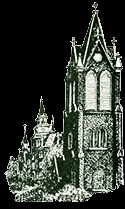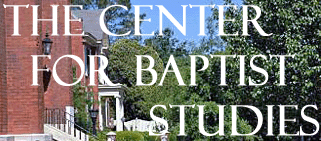|
Encouraging scholarship, strengthening faith identity, and interpreting contemporary issues in Baptist life. |
||
 |
|
Baptists and Human
Rights |
|
Home • Staff • Local Church • News & Views • Issues • Bulletin • Conferences / Seminars • Sabbaticals • Certificate • Links |
||
|
BAPTISTS AND HUMAN RIGHTS FROM A UNITED NATIONS PERSPECTIVE David F. D'Amico Human rights issues clamor for the attention of religious persons around the world. The suffering minorities oppressed politically, economically, and religiously in many countries of the world--Myanmar, Afghanistan, Sudan, Thailand, China--to name a few, receive some media coverage in the United States. For eleven years ministering at the UN as CBF NGO (non-governmental representatives) my wife Ana and I were privileged to interact and advocate with many persons of varied religious perspectives with whom we shared the common longings for human rights. It was encouraging to host in our apartment Eastern European scholars who were studying at Columbia University recently liberated from Communist regimes and to distribute to them biblical portions. We had the privilege of embracing the Nobel Peace laureate Rigoberta Menchu from Guatemala, and hear her story about her struggle for human rights of the indigenous people of her country. At the United Nations, the cause of human rights is an ideal in process. The Human Rights Commission has gone through some reform lately but functions mainly as “a conscience” to states which bypass the Geneva Conventions and oppress people of different religious persuasions. It is composed of 53 member states and is led by the High Commissioner for Human Rights, Ms. Louise Arbour, a justice of Canada’s Supreme Court. The UN community commemorates in December the anniversary of the adoption by the General Assembly of the Universal Declaration of Human Rights (UDHR) approved in Paris on December 10, 1948. Many leaders of several Protestant denominations lobbied earnestly for the Charter of the UN and later valiantly sensitized churches about the UDHR. Enlightened Baptist leaders participated actively in the proceedings. J. M. Dawson, the chairperson of what is now the Baptist Joint Committee for Religious Liberty, narrated in his memoirs the sense of expectancy he experienced when he attended, in 1945, the organizational meeting of the United Nations in San Francisco. ATo that meeting I carried a hundred thousand petitions from Baptists, North and South, white and Negro, asking that the Charter to be adopted would include a guarantee of full religious liberty for every human being. [Dawson, A Thousand Months to Remember, p. 161]. Dawson later addressed the Baptist World Congress in Copenhagen in 1947 setting high hopes for the value of the UN in world affairs. We hope also for the United Nations to inaugurate a new birth of religious freedom for the world. [1947 Baptist World Congress Minutes, p. 71]. After fifty-eight years of the adoption of the UDHR, many advocates of religious liberty, peace and justice continue their efforts representing different religious persuasions including Christian denominations at the UN. They sensitize ambassadors, and diplomats of the 191 nations states accredited at the UN, and organize forums seeking religious freedom, and the enforcement of all human rights to all the peoples of the world. The American Bible Society allocated funds, in 1998, to publish one million copies of a commemorative booklet, Life in All Its Fullness: The Word of God and Human Rights. The booklet was widely distributed by many denominations and the Baptist Joint Committee for Religious Liberty.
The Universal Declaration of Human Rights The Commission on Human Rights was established June 21, 1946 under the Economic and Social Council. Eleanor Roosevelt was chosen as chair. Dr. Charles Malik, from Lebanon, was the rapporteur. It met in three long sessions between 1946 and 1948. It drafted the UDHR which was adopted by the General Assembly in Paris, December 10, 1948. An eyewitness reported about the membership of the commission in its political and religious composition. "The membership of the drafting Commission had to mirror proportionately the then membership of the whole UN of that time. Three Commission members came from dictatorial nationalist governments in the Middle East and Asia. Four represented communist dictatorships in Eastern Europe. Eleven were from constitutional governments in Europe, the Americas, and the Pacific region--all societies that operated more or less democratically. In half of the 18 countries comprising the Commission most of the population was Christian, in three it was Islamic, in one it was Hindu, and in five most of the people were officially regarded as atheist. . . .A BBC broadcast quipped about "eighteen politicians chosen to make a new draft of the Sermon on the Mount." Howard Schomer, AAll Human Beings," Gear--Global Education and Advocacy Resource, June, 1998, p. 6.
President Jimmy Carter and Human Rights President Carter is an active Baptist lay person and has shown publicly how his religious beliefs have shaped his public life. He observed: "America didn't create human rights. Human rights created America." Dan Ariail & Cheryl Hcekler-Feltz, The Carpenter's Apprentice: The Spiritual Biography of Jimmy Carter (Grand Rapids: Zondervan, 1996), p. 72. Carter's presidency greatest achievement was the Camp David Accord between Israel and Egypt in 1978. Since 1981, The Carter Center in Atlanta has been devoted to many initiatives. Among the many aspects of the work of the center one, the Human Rights Program has outstanding impact among world leaders. The Cooperative Baptist Fellowship and Human Rights Global mission representatives, following the tradition of William Carey when he advocated religious freedom changes in India in the 19th century, have attempted human rights and religious liberty initiatives in areas of the world where religious freedom has been curtailed. During the Balkans conflict of the late 1990s global mission personnel advocated freedom and denounced genocide. Other missionaries have worked diligently among refugees, internally displaced persons, and illegal immigrants in Canada, Morocco, Spain, South Africa, Zambia, Angola, India, Thailand, Macedonia, and the United States, attempting to uphold the Christian, Baptist, and American tradition of religious liberty. The Jimmy and Rosalynn Carter Offering for Religious Liberty and Human Rights gathered at the CBF general assembly has collected more than $83,300 in the two special occasions in 2005 and 2006. The funds are administered by the CBF Advisory Council. There have been allocations to two initiatives of Global Missions in Thailand and Morocco among refugee organizations which were reported at the CBF general assembly in Atlanta in June, 2006. Amid the uncertainties of the status of the political implementation of human rights, communities of all the world religions will continue to play a significant role in the twenty-first century. Although human rights are a lofty ideal, individuals and nations are still struggling to measure up to the model of the Prince of Peace and to enforce all human rights for all peoples of the world. Baptists must pray, become informed, and earnestly attempt in their own sphere of influence to be God's instruments for human rights.
|
||
|
The Center for Baptist Studies, Mercer University, 1400 Coleman Avenue, Macon, GA 31207 Phone (478) 301-5467 |
||
